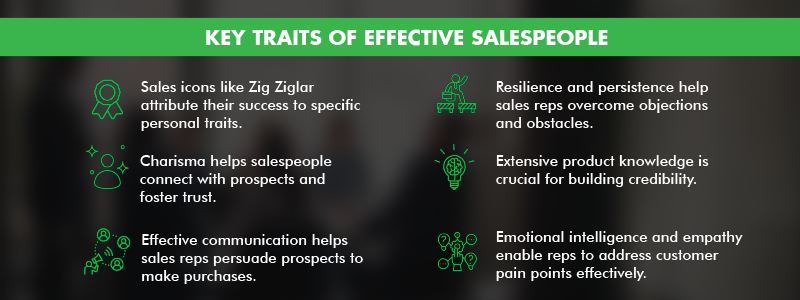Building Your Dream Sales Team: Tips for Selecting the Right Salespeople
Sales roles can be among the most difficult to fill in business because the options are almost limitless


If you’re a forward-thinking salesperson or leader, you’ve probably tried to learn everything you can from sales icons like Zig Ziglar or Mary Kay Ash. But have you ever thought about what really propelled these sales giants to the top?
It wasn’t just their knowledge of the industry or even their tactical strategies. It was their unique personal traits – exceptional charisma, unwavering determination, and ability to connect with others – that enabled them to shatter most, if not all, of their sales goals and targets.
And by instilling these key drivers of sales success in your own team, you can take your business to a whole new level. Just keep reading to find out how.
All highly successful salespeople share one distinctive trait – charisma. This quality makes them naturally likable and enables effortless connections with others. But what can ordinary salespeople do to make themselves more likable and charismatic?
For starters, they need to remember that first impressions are key. The initial 90 seconds have a huge influence on a prospect’s opinion. And if you flub those 90 seconds, it’s tough to recover.
When interacting with clients for the first time, make sure your salespeople understand that they need to go all-in. This involves exuding confidence, maintaining eye contact, and clearly articulating the value proposition for a positive and memorable initial encounter.
If your reps can create a good rapport right off the bat, prospects will be more likely to view them as trustworthy and deserving of respect – and that impression goes a long way toward closing the deal.
Effective communication is pivotal in sales, as it is the key to persuading prospects to purchase a particular product or service. For salespeople to communicate effectively, they must master the art of speaking clearly and concisely. That’s crucial, especially when explaining details like product features, benefits, and pricing.
But communication is a two-way street, and the often-overlooked skill of an effective communicator is active listening. Make sure your reps understand that they need to talk TO their prospects, not AT them. The former implies that the two parties are having a mutual conversation, the latter is like attending a lecture.
Good sales reps encourage prospects to ask questions, express concerns, and freely share their thoughts while listening attentively and avoiding unnecessary interruption. Then they acknowledge their prospects’ needs and concerns and propose solutions. This makes prospects feel heard, valued, and respected, the building blocks of a strong relationship.
Effective reps should also remember to tailor their message to fit each unique customer and hone their non-verbal communication skills. Remember that communication, like any useful skill, only gets better through practice.
Every salesperson, no matter how successful, has encountered an uncountable number of objections and rejections. It’s how they respond to these challenges that separates the superstars from the also-rans.
The best salespeople understand that rejections and objections are simply obstacles that can be overcome. As such, they don’t let these issues bog them down. A NO doesn’t scare them; it motivates them to go back to the drawing board and come up with a better pitch or more compelling sales script.
That is precisely the spirit you need to instill in your sales reps if you want them to succeed. Make sure they understand the need to avoid taking rejections personally so they can bounce back without losing motivation or momentum.
And whenever one of your sales agents needs that extra push to get over rejection, try using inspirational stories of perseverance to motivate them. Like the story of Jack Canfield, whose “Chicken Soup for the Soul” was rejected by over a hundred publishers before someone took a chance on it – and sold hundreds of millions of copies.
A salesperson with exceptional product knowledge stands a better chance of persuading prospects to buy. This is probably the easiest key to success to instill in your employees. They just need to do their homework. Make sure your sales team:
Product knowledge is the key to building credibility. Before making a purchase, prospects need to trust your products and, most importantly, your company. And that’s not going to happen if your sales reps sound like they don’t know what they’re talking about.
Successful salespeople know how to engage customers on a deep level and understand their thoughts and feelings. That is what pros call emotional intelligence and empathy. With empathy, your sales team can acknowledge and address customer pain points by positioning your product as the solution to their unique problems. And when turned inward, emotional intelligence can help salespeople overcome stress and frustration, ensuring they manage challenging situations comfortably and make thoughtful decisions.
Do your sales team members have the traits they need to succeed, including charisma, resilience, and the ability to communicate effectively? That’s a trick question because even the best of the best need continuing training and practice to keep their skills honed to perfection. And that’s where MetaGrowth Ventures comes in.
Our experts can help you craft a tailored strategy for training your salespeople that addresses their weak points and sharpens their strengths.
Don’t let a lack of training hold your sales team back. Reach out to MetaGrowth, and let us help you build a world-class sales team that can propel your brand to the stratosphere.
Written by
Josh Hirsch
Sales roles can be among the most difficult to fill in business because the options are almost limitless